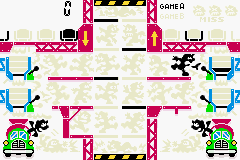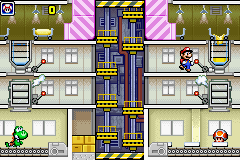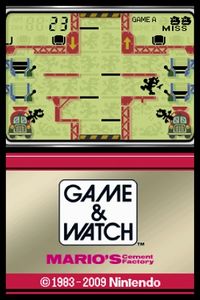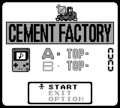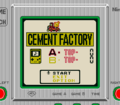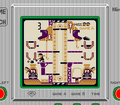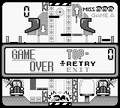Mario's Cement Factory: Difference between revisions
m (Text replacement - "\|(right|thumb)(\|[^\]\n]+)?\|(right|thumb)" to "|thumb$2") |
m (Text replacement - "{{[Ww]ikia" to "{{fandom") |
||
| Line 99: | Line 99: | ||
==References in later games== | ==References in later games== | ||
*[[Super Smash Bros. (series)|''Super Smash Bros.'' series]]: [[List of fighters debuting in Super Smash Bros. Melee#Mr. Game & Watch|Mr. Game & Watch]] has an attack that involves him grabbing opponents with a similar pose to how Mario grabs levers in this game. | *[[Super Smash Bros. (series)|''Super Smash Bros.'' series]]: [[List of fighters debuting in Super Smash Bros. Melee#Mr. Game & Watch|Mr. Game & Watch]] has an attack that involves him grabbing opponents with a similar pose to how Mario grabs levers in this game. | ||
*''{{ | *''{{fandom|rhythm-heaven|Rhythm Heaven Fever}}'': Mr. Game & Watch appears in the Rhythm Game {{fandom|rhythm-heaven|Working Dough}}, posed similarly to the lever-grabbing animation from this game. | ||
==Trivia== | ==Trivia== | ||
Revision as of 08:03, May 19, 2023
| Mario's Cement Factory | |||
|---|---|---|---|
| File:ML-102 Game1 Front.jpg The New Wide Screen version of Mario's Cement Factory | |||
| Developer | Nintendo R&D 1 | ||
| Publisher | Nintendo | ||
| Platform(s) | Game & Watch, Mini Classics, Nintendo DSi, Nintendo 3DS | ||
| Release date | Game & Watch: Template:Release Template:Release Mini Classics: Template:Release Nintendo DSi (DSiWare): Template:Release Nintendo 3DS (eShop): Template:Release[?] | ||
| Genre | Puzzle/Platformer | ||
| Rating(s) |
| ||
| Mode(s) | Single player | ||
| Input | Game & Watch:
Nintendo DS: Nintendo 3DS:
| ||
Mario's Cement Factory is a Game & Watch game. Two versions of the game were produced: The first was for the Game & Watch Table Top released on April 28, 1983, and the second was a more conventional New Wide Screen Game & Watch that was released on June 16, 1983. Mario's Cement Factory was the first game in the Table Top series. The Table Top game resembles an arcade cabinet, and it is more colorful than the New Wide Screen game. In both versions, Mario's mission in the cement factory is to open doors to prevent cement containers from overflowing. To get to the different containers, Mario has to jump onto moving platforms. The New Wide Screen version was rereleased as a Mini Classics and is featured in the Gallery Corner in Game & Watch Gallery. It is also featured as a minigame in Game & Watch Gallery 4 with a Classic version and an updated "Modern" version.
The alarm indicator of the Table Top version is a bell that is located beside the upper lift section, and a driver rings the bell when the alarm goes off. In the New Wide Screen version, the alarm indicator is also a bell located beside the upper lift section, but the bell just swings when the alarm goes off.
Mario's Cement Factory also appears as one of the minigames in Game Boy Gallery, though it is simply called Cement Factory and features no Mario characters, and the playable character is the same unnamed character seen in the other minigames.
Gameplay
Classic version
There are two drivers, each in a truck under a container. Mario earns a point each time he empties a load of cement from the upper hopper and two points each time he empties a load from the lower hopper. Each container can hold only three loads of cement. Allowing the containers to overflow causes cement to spill down onto the workers, hurting them and giving Mario one miss. Falling off an elevator platform also earns a miss, as well as touching the very top of the screen and getting crushed by an elevator platform, or touching the very bottom and getting shocked by the floor of the elevator. In all versions of the game, there is an area on the lowermost portion of the elevator that Mario can use to save himself from touching the very bottom and getting shocked. On the Table Top and Game Boy Gallery versions, there is a similar area on the uppermost portion of the elevator. This does not appear on any other version of the game. If Mario gets 300 points without any misses, the points will be worth double until he does get a miss. If he has any misses at said score, all misses will be cleared instead. When he receives three misses, the game is over.
Modern version
The Modern version of the game has Mario working in a cookie factory. Yoshi and Toad are featured instead of the drivers, with Yoshi eating the Yoshi Cookies made on the left conveyor belt and Toad packaging the Yoshi Cookies made on the right conveyor belt. Boos also occasionally appear, taking up cookie dough slots on the second floor. Unlike in Classic Mode, however, Mario is allowed to fall down onto an elevator platform, but touching the very bottom or top still earns the player a miss. When Mario amasses 200, 500, and 700 points, a heart appears for him to remove a miss. Music is also featured in this version, with the tempo changing depending on the speed of the game.
Selecting the game without starting it also results in a humorous sequence being played. In particular, Yoshi and Toad are putting cookie batter on a conveyor belt each, only for Toad's batter to get stolen by a Boo, causing him to cry, and then the Boo drops the batter on Yoshi, with it being a large enough quantity that Yoshi is engulfed save for the eyes, while the Boo sticks out his tongue in a taunting manner as Yoshi is baffled at the entire situation.
Controls
 (left and right): Move
(left and right): Move and
and  : Open
: Open
DSiWare
Another port of the original version was released in August 2009 for DSiWare in Japan and March 2010 in America, Europe, and Australia. It is also available in the Nintendo 3DS eShop as DSiWare. In July–August 2012, to coincide with the release of New Super Mario Bros. 2, it was featured on the Mario folder in the main screen.
DSi Shop description
American
Nintendo first began releasing the Game & Watch series in 1980. This collection of games was available on portable LCD devices, and each title featured a game and a clock. Each Game & Watch title features two modes of play: GAME A (normal difficulty) and GAME B (more advanced play). While some controls have been changed in the DSiWare version to better suit the Nintendo DSi system, the appearance of the game itself has not been altered.
Conveyor belts carry tubs of cement to the mixers below. Use the elevators to move Mario to different levels of the factory, dumping cement from the top mixers to the mixers below and into the trucks. Earn points for every load of cement you drop from the mixers to the cement truck. Receive mistake icons by letting a mixer overflow with cement, trying to get on an elevator when you are not level with it, or hitting the floor or ceiling while riding an elevator; receive three mistake icons, and it's game over!
European
Experience a piece of Nintendo history with the Game & Watch series for Nintendo DSiWare. Each title is a perfect recreation of a classic LCD game from the early 1980s, including normal Game A and alternate Game B modes. And no Game & Watch title would be complete without the 'Watch' function - each title includes a fully functional clock. In Mario’s Cement Factory, your job is to keep the factory going. Move Mario around the platforms and elevators, pull the levers to drop cement into containers, and fill up the trucks waiting to make their deliveries. Just like other Game & Watch titles, Game B mode is the tougher challenge; with faster, randomly moving platforms.
Gallery
- MCF.jpg
The Table Top version of Mario's Cement Factory
Mario in the Table Top version's TV commercial
A sprite of the drivers
Modern version
Game Boy Gallery (Cement Factory)
Mode select (Super Game Boy)
References in later games
- Super Smash Bros. series: Mr. Game & Watch has an attack that involves him grabbing opponents with a similar pose to how Mario grabs levers in this game.
- Rhythm Heaven Fever: Mr. Game & Watch appears in the Rhythm Game Working Dough, posed similarly to the lever-grabbing animation from this game.
Trivia
- Early models of the Table Top version of Mario's Cement Factory used a slightly faster rearrangement of the first four seconds of "Another One Bites the Dust," a song released in 1980 by the British rock band Queen, for the game start jingle.[1] This was replaced in a later revision with an original jingle.[2] An update of this jingle reappears in the Game Boy Gallery version.[3]
References
- ^ CM-72 Early Table Top version. YouTube. Retrieved May 14, 2022.
- ^ CM-72A Late Table Top version. YouTube. Retrieved May 14, 2022.
- ^ Game Boy Gallery soundtrack. YouTube. Retrieved May 14, 2022.
External links
- North American site
- Nintendo UK site
- Info page for the Table Top version of Mario's Cement Factory on In the Attic, a website dedicated to classic videogames (Internet Archive: Wayback Machine)
- Info page for the New Wide Screen version of Mario's Cement Factory on In the Attic (Internet Archive: Wayback Machine)
| Game & Watch games | ||
|---|---|---|
| Super Mario franchise | Donkey Kong (1982, MS) • Mario Bros. (1983, MS) • Mario's Cement Factory (1983, TT/NWS) • Mario's Bombs Away (1983, PS) • Donkey Kong Hockey (1984, MVS) • Super Mario Bros. (1986, CrS | 1987, Sp | 1988, NWS) • Mario the Juggler (1991, NWS) • Game & Watch: Super Mario Bros. (2020, CoS) | |
| Donkey Kong franchise | Donkey Kong (1982, MS) • Donkey Kong Jr. (1982, NWS | 1983, TT/PS) • Donkey Kong II (1983, MS) • Donkey Kong 3 (1984, MVS) • Donkey Kong Circus (1984, PS) • Donkey Kong Hockey (1984, MVS) | |
| Miscellaneous | Green House (1982, MS) | |
| MS: Multi Screen • TT: Table Top • PS: Panorama Screen • NWS: New Wide Screen • MVS: Micro VS. System • CrS: Crystal Screen • Sp: Special • CoS: Color Screen | ||


